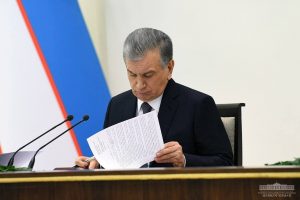In his November 9 inauguration speech, Uzbek President Shavkat Mirziyoyev raised eyebrows in suggesting that constitutional reform was on the horizon.
“So, after consulting again with senators and deputies, with the general public, with the people, after studying international experience of constitution building, we should carefully think through the question of enhancing our Basic Law, which defines the country’s current and future development,” Mirziyoyev said, after noting that “many states” have carried out constitutional reforms during periods of “radical changes.”
The speech, coming after Mirzyoyev sailed to an easy victory in the country’s October 24 election, provided no details as to what in the Uzbek Constitution would be up for reform. But ahead of the country’s Constitution Day, December 8, Mirziyoyev clarified his proposal.
Mirziyoyev argued that a “constitutional basis and an even stronger legislative base” would be needed to implement the country’s development strategy. As Kun.uz laid out, Miziyoyev offered nine general proposals. He said it was necessary to replace the principle of “state-society-person” with “person-society-state.” He said that the main criteria in the process of economic reforms ought to be to “ensure human interests” and that the role of civil society institutions should be consolidated in the constitution. Mirziyoyev proposed defining the constitutional foundations of “the family” and “traditional human values” alongside strengthening interethnic harmony. He also nodded to a need to reflect youth policy in the constitution, as well as increase protections against child labor and ensure the rights of the disabled and elderly. Mirziyoyev said that it was important to consolidated at the constitutional level the development of schools from kindergarten to higher education.
Listed as the sixth proposal but arguably of a separate character, Mirziyoyev said “the time has come” to enshrine the “New Uzbekistan – a social state” principle as a “constitutional norm.”
While Mirziyoyev has now laid out broad proposals for constitutional updates, it’s yet to be seen how those proposals will translate into actual amendments. In his speech, the Uzbek president made clear his hope for the amendments to be made in 2022, in conjunction with the 30th anniversary of the Uzbek Constitution.
RFE/RL’s Uzbek Service, known as Ozodlik, noted that since its adoption on December 8, 1992, the Uzbek Constitution has been amended 15 times (in 1993, 2003, 2007, 2011, 2014, and 2017). Ozodlik contrasted it with the United States Constitution, which has been amended just 27 times in 234 years (and the first 10 of those amendments were ratified together in 1791, as what is now called the Bill of Rights). For further comparison, the Indian Constitution, as of 2019 at least, had been amended 103 times in 75 years. Rather than just amending the existing constitution, neighboring Kyrgyzstan has cycled through several different constitutions altogether (in 1993, 2007, 2010, and 2021). Each state has its own process for constitutional tinkering, but it’s evident that in some states the process is easier to complete than in others. The procedure for amending the Uzbek Constitution requires the adoption of a law by at least a two-thirds majority of the Oliy Majlis, the Uzbek parliament, or approval via a national referendum.
Mirziyoyev’s predecessor, Islam Karimov, stayed in power for nearly 30 years despite a two-term limit in part under the convoluted argument that constitutional reforms reset the clock on how many terms he had actually served. Whether Mirziyoyev tries to replay Karimov’s tactic is a matter of mere speculation at this point; his current second (and theoretically final) term runs until 2026.

































